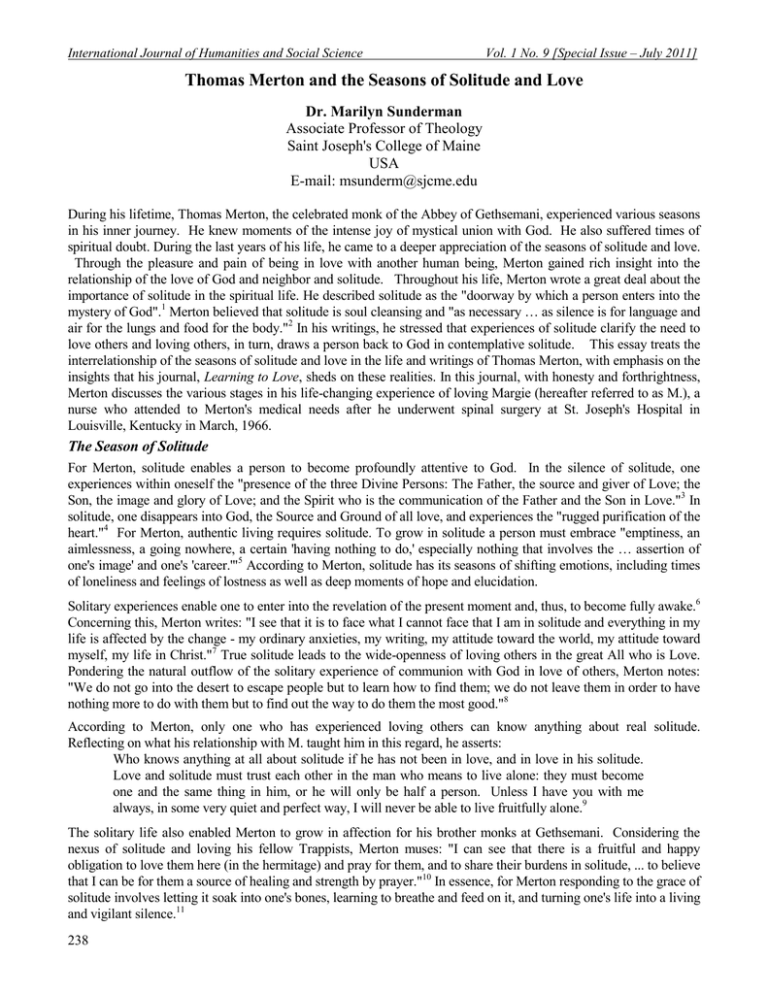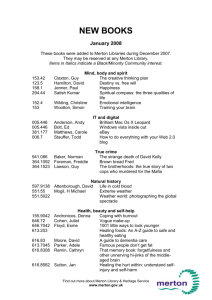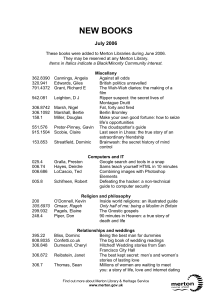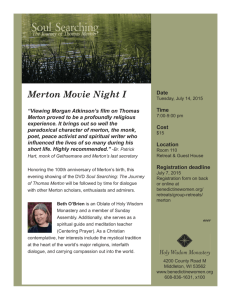Document 10465852
advertisement

International Journal of Humanities and Social Science Vol. 1 No. 9 [Special Issue – July 2011] Thomas Merton and the Seasons of Solitude and Love Dr. Marilyn Sunderman Associate Professor of Theology Saint Joseph's College of Maine USA E-mail: msunderm@sjcme.edu During his lifetime, Thomas Merton, the celebrated monk of the Abbey of Gethsemani, experienced various seasons in his inner journey. He knew moments of the intense joy of mystical union with God. He also suffered times of spiritual doubt. During the last years of his life, he came to a deeper appreciation of the seasons of solitude and love. Through the pleasure and pain of being in love with another human being, Merton gained rich insight into the relationship of the love of God and neighbor and solitude. Throughout his life, Merton wrote a great deal about the importance of solitude in the spiritual life. He described solitude as the "doorway by which a person enters into the mystery of God".1 Merton believed that solitude is soul cleansing and "as necessary … as silence is for language and air for the lungs and food for the body."2 In his writings, he stressed that experiences of solitude clarify the need to love others and loving others, in turn, draws a person back to God in contemplative solitude. This essay treats the interrelationship of the seasons of solitude and love in the life and writings of Thomas Merton, with emphasis on the insights that his journal, Learning to Love, sheds on these realities. In this journal, with honesty and forthrightness, Merton discusses the various stages in his life-changing experience of loving Margie (hereafter referred to as M.), a nurse who attended to Merton's medical needs after he underwent spinal surgery at St. Joseph's Hospital in Louisville, Kentucky in March, 1966. The Season of Solitude For Merton, solitude enables a person to become profoundly attentive to God. In the silence of solitude, one experiences within oneself the "presence of the three Divine Persons: The Father, the source and giver of Love; the Son, the image and glory of Love; and the Spirit who is the communication of the Father and the Son in Love."3 In solitude, one disappears into God, the Source and Ground of all love, and experiences the "rugged purification of the heart."4 For Merton, authentic living requires solitude. To grow in solitude a person must embrace "emptiness, an aimlessness, a going nowhere, a certain 'having nothing to do,' especially nothing that involves the … assertion of one's image' and one's 'career.'"5 According to Merton, solitude has its seasons of shifting emotions, including times of loneliness and feelings of lostness as well as deep moments of hope and elucidation. Solitary experiences enable one to enter into the revelation of the present moment and, thus, to become fully awake.6 Concerning this, Merton writes: "I see that it is to face what I cannot face that I am in solitude and everything in my life is affected by the change - my ordinary anxieties, my writing, my attitude toward the world, my attitude toward myself, my life in Christ."7 True solitude leads to the wide-openness of loving others in the great All who is Love. Pondering the natural outflow of the solitary experience of communion with God in love of others, Merton notes: "We do not go into the desert to escape people but to learn how to find them; we do not leave them in order to have nothing more to do with them but to find out the way to do them the most good."8 According to Merton, only one who has experienced loving others can know anything about real solitude. Reflecting on what his relationship with M. taught him in this regard, he asserts: Who knows anything at all about solitude if he has not been in love, and in love in his solitude. Love and solitude must trust each other in the man who means to live alone: they must become one and the same thing in him, or he will only be half a person. Unless I have you with me always, in some very quiet and perfect way, I will never be able to live fruitfully alone.9 The solitary life also enabled Merton to grow in affection for his brother monks at Gethsemani. Considering the nexus of solitude and loving his fellow Trappists, Merton muses: "I can see that there is a fruitful and happy obligation to love them here (in the hermitage) and pray for them, and to share their burdens in solitude, ... to believe that I can be for them a source of healing and strength by prayer."10 In essence, for Merton responding to the grace of solitude involves letting it soak into one's bones, learning to breathe and feed on it, and turning one's life into a living and vigilant silence.11 238 The Special Issue on Contemporary Issues in Social Science © Centre for Promoting Ideas, USA www.ijhssnet.com Merton writes: To love solitude and to seek it does not mean constantly traveling from one geographical possibility to another. A man becomes a solitary at the moment when, no matter what may be his external surrounding, he is suddenly aware of his own inalienable solitude and sees that he will never be anything but solitary. From that moment, solitude is not potential - it is actual.12 In solitude, one encounters God who is Love and recognizes that one is inseparable from all those whom God has created. The experience of solitude enables a person to extend God's graciousness to others through genuine and gentle care of them as they are. Merton's Call to be a Hermit Throughout the twenty-seven years of his monastic life, Thomas Merton desired deeper and deeper experiences of solitude. As early as 1949, he journaled: "Everything in me cries out for solitude and for God alone."13 During the last few years of his life when he lived in a hermitage at Gethsemani, Merton realized that he preferred quietis contemplationes, i.e., the quietude of inner repose that the grace of the hermit life afforded him. As a hermit, Merton faced the fact that if he were to become a completely forgotten, invisible person, he would be content. Flashes of truth such as this nourished him as he continued his spiritual journey. When the fifty-one year old hermit Merton fell in love with M., he struggled with how this unexpected experience could relate to his life of solitude. Initially, being a hermit and being in love with a beautiful young woman seemed to him to be totally at odds with each other. Merton experienced intense struggle with the ambivalence of this situation and only gradually came to the realization that it was possible to integrate this relationship into his vocation to solitude. As a hermit, in the sea of his solitude, he eventually found a place wherein he would always know, reverence, and love M. Regarding this, Merton journals: I love the aloneness of the night. In a way I cannot be without you: you are part of my life itself, and of my very loneliness. I know we are together in our hearts. ... To be alone in a solitude that is with you, though without your bodily presence, is certainly a special kind of freedom.14 A strong indication that Merton believed that his hermit life and his love for M. were compatible lies in his following assertion: "[I]f I love her purely and unselfishly - as I surely do here in solitude - then my love for her is part of my love for Him, part of my offering of myself to God.15 On September 8, 1966 (the Feast of the Nativity of Mary), Merton made a choice to live as a hermit-monk for the rest of his life, insofar as his health would permit. It is important to note that this commitment came on the heels of Abbot James Fox's admonition to Merton that he quickly bring closure to his experience with M. In formally deciding to live out the rest of his life as a hermit, Merton was convinced that he was following the call within the depths of his being to be what he was supposed to be. Merton described the hermitage as a marvelous place where he could enjoy the pure delight of being utterly alone in a quiet, cozy environment that restored his peace and sanity. Here he relished the tempo of long, quiet days and, in this sacred space, faced his truest self with all its frailness, limitedness, fears, and anxieties. Some of Merton's reflections on the life he knew in his hermitage include: Steady rain all day. It is still pouring down on the roof, emphasizing the silence in the hermitage, reinforcing the solitude. I like it.16 I don't know what happens to time in the hermitage. Three and four hours in the pre-dawn go by like half an hour. Reading, meditation, a few notes, some coffee and toast - there is not much to show for it, but it is probably the most fruitful part of the day.17 Yesterday was quiet and lonely in the hermitage with rain batting down interminably and a fire on the hearth.18 The Season of Love According to Merton, the season of solitude makes possible the season of love and vice versa. Love, which is the key to the true meaning of human existence, deepens, intensifies, elevates, and strengthens life. Love is the most profound, creative, and transforming power in human nature. Reflecting on love as the act of self-surrender in freedom in his own life, Merton writes: "I cannot live without giving love back to a world that has given me so much. And, of course, it has to be the love of a man dedicated to God - and selfless, detached, free, completely open love."19 239 International Journal of Humanities and Social Science Vol. 1 No. 9 [Special Issue – July 2011] This open love, which roots and grounds itself in God's love, promotes the peace and wellbeing of the other. To love is to reverence another's being as the dwelling place of God. To reach out to another in love is to enter more deeply into the God who is Love and, thus, to grow in greater union with God. For Merton, unless a person is able to pass out of self in order to give self to another/others in love, he/she cannot enter into the deepest self and pass through that center into God.20 Thus, according to Merton, love demands a kind of death to one's own being.21 Regarding this kenotic dimension of loving, Merton asserts "To love you have to climb out of the cradle, where everything is 'getting,' and grow up to the maturity of giving, without concern for getting anything special in return."22 Loving, which demands spending oneself for the other's sake,23 is perfected through imperfect acts. By giving oneself to another/others in love, one becomes more fully human. Merton's Love of M. When Thomas Merton met M., his understanding of the meaning of love took on new existential dimensions. He viewed his relationship with M. as a tremendous grace from God and a sacred trust. Regarding this, he wrote: "She is the most beautiful thing that has ever happened to me and her love is a gift from heaven. ... Her love is as precious to me as life itself."24 According to biographer Michael Mott, M. was "the one person to whom Merton felt he could open his whole mind without restraint."25 Merton's relationship with M. transformed him; it took him out of himself in greater vulnerability and changed him forever. For the first time in his life, he experienced the tremendous depths of his inner capacity to love and be loved by another human being. About this, he journals: I realize that the deepest capacities for human love in me have never even been tapped, that I too can love with an awful completeness. Responding to her has opened up the depths of my life in ways I cannot begin to understand or analyze now.26 Merton surrendered to the creative action of this love and, in doing so, reached a new level of wholeness through self-transcendence. Through his relationship with M., Merton came to understand, in a powerfully existential way, that loving another creates a spring of happiness and joy in life. Feeling one in being with M., at one point he reflected that he loved her so much that he could hardly think of anything else but her. In M., Merton recognized that he had found someone whom he had been looking for all his life. Merton experienced a full range of emotions (doubt, fear, panic, overwhelming gratitude and delight) concerning his relationship with M. He considered his love for M. a "sacred gamble,"27 which he described as a "risky, hard-to-handle reality."28 Sometimes the sexual dimensions of this relationship deeply disturbed him because he feared what might happen if the emotional and physical expression of this love ever got out of hand. Merton dared to love M. and bore the anxiety that doing so brought into his life. He feared that the contradictions involved in this relationship could eventually hurt both of them but contended, nevertheless, that their love for each other was stronger than any possible hurt they might experience. Merton characterized M.'s love for him as tender, sincere, and utterly beautiful. Aware that she loved him in his limitations, he wrote: "I am known to her as I am, and many of the things she loves in me are things I find humiliating and impossible."29 Merton loved M. freely and spontaneously. He expressed the all-absorbing nature of his love for her in the following way: "The thing that was most clear was the simple perfection of our love, the total 'givenness' of it and our complete surrender to its delights and perfection, its peace, its freedom, with no care and no afterthought."30 In the midst of the ecstasy of his relationship with M, Merton eventually concluded that the appropriate level at which he should love her was spiritual. In the following communication to M, Merton makes explicit the depth of his affection for her: Only one thing I ask: that all our life we consider each other most faithful, most loving and most special friends, united by a deep and unique bond that was made by God rather than by ourselves. It is on this level that I will always love you, always think of you, always want to know how you are and how things are going with you.31 Merton desired that his relationship with M. be a "deep lasting union of hearts."32 He trusted that the love that they shared would endure the test of time. He reflects: "There is something completely permanent and irrevocable in our lives: the love that we have known in each other, that has changed us, that will remain with us in a hidden and transfigured and transfiguring presence."33 Merton believed that, finally and forever in heaven, M. and he would be united in God because their love for each other had an eternal quality. M.'s perspective on her relationship with Merton remains an untold story. Commenting on this, Lawrence Cunningham states: " 240 The Special Issue on Contemporary Issues in Social Science © Centre for Promoting Ideas, USA www.ijhssnet.com One cannot but feel … that too much has been made about the agonies of the monk to the detriment of the young woman whose own voice is silent and whose story we know only from one side which is not hers."34 Though this is the case, one can speculate that M. would concur with Merton that their love for each other transcends time. Conclusion In and through his relationship with M., Thomas Merton learned a great deal about the nexus of solitude and love. Within the context of his hermit-monk vocation, he courageously faced the paradoxical nature of loving M. On the one hand, he declared: "I can't go on like this. ... [A]fter all I am supposed to be a monk with a vow of chastity and though I have kept my vow - I wonder if I can keep it indefinitely…"35 On the other hand, he later confessed: "We are terribly in love and it goes very deep... I have never loved anyone so much, never wanted to give myself so much to anyone, and it is totally impossible."36 During some moments, he felt that the only way to resolve his dilemma was to go away with M., live with her, surrender to their love, and forget everything else. But then deep within, Merton listened to the call to lead a solitary life. Within the context of his monastic vocation, Thomas Merton learned both the joy and anguish of loving another human being. As John Laughlin notes: "This relationship … helped him [Merton] confront and reconcile his long held doubts about his ability to form an intimate relationship."37 Through the beauty and pain of his experience with M., Merton came to a profound understanding that solitude and love bear fruit only in mutuality. In the final analysis, Merton recommitted himself to being a hermit, which he described as a "life of silent adoration"38 and "complete dependence… upon the hidden mercy of our Heavenly Father."39 For Merton, the choice of the solitary life was an act of real courage. In Thoughts in Solitude, he asserts that "the solitary must be a man who has the courage to do the thing he most wants in the world to do - to live in solitude."40 Biographer Monica Furlong notes that Merton's experience with M. left him with "a new awareness that he was able to love and be loved, but … also the discovery of how totally he was given, body and soul, to his life of monk and hermit."41 Furlong also indicates that the recommitted hermit Merton anguished over the suffering he had caused M.42 Merton requested that, after his death, a twenty-five year period elapse before the publication of his journal, Learning to Love. Poignantly aware of what he had learned from his relationship with M., Merton was convinced that this part of his life needed to be shared with others. He insisted that it "… needs to be known, too, for it is part of me. My need for love, my loneliness, my inner division, the struggle in which solitude is at once a problem and a 'solution."43 Lawrence Cunningham reflects that "it may well be that he [Merton] left a record of that experience precisely to fill out his portrait as a deeply human and flawed person."44 Through his relationship with M., Merton "experienced, at a radically new depth, God present in another human being and God in one person loving God in another."45 He once wrote: "When people are truly in love … they are … more alive, more understanding. … They are … new beings. They are transformed by the power of their love."46 This certainly was the case in the intersection of M. and Merton's lives. The awesome beauty of loving M. enabled Merton to embrace his humanity in a new and deeper way. As Michael Higgins rightly indicates: To be a fully integrated monk he [Merton] had to be a fully integrated human being, to accept his … yearning for reciprocated love; he had to move beyond sublimation, abstraction, and platonic love to a concrete, particular, and incarnate love."47 Through the joy and anguish of his profoundly intimate relationship with M., Thomas Merton rediscovered his vocation to solitude and, with every fiber of his being, could finally pray with utmost confidence to God: In solitude I have at last discovered that You have desired the love of my heart, O my God, the love of my heart as it is - the love of a man's heart."48 _____________________________________________ 1 Thomas Merton, Disputed Questions (New York: Harcourt Brace & Co., 1960), p. 189. Thomas Merton, No Man is an Island (New York: Harcourt Brace & Co., 1955), pp. 246-47. 3 Thomas Merton, The Inner Experience: Notes on Contemplation, ed. William H. Shannon (New York: HarperCollins Publishers, Inc., 2003), p. 69. 4 Merton, Disputed Questions, p. 198. 5 Thomas Merton, Learning to Love: Exploring Solitude and Freedom, ed. Christine M. Bochen (New York: HarperCollins Publishers, Inc., 1998), p. 357. 2 241 International Journal of Humanities and Social Science 6 Vol. 1 No. 9 [Special Issue – July 2011] Merton, Disputed Questions, p. 184. Merton, Learning to Love, pp. 22-23. 8 Thomas Merton, Seeds of Contemplation (New York: New Directions, 1949), p. 58. 9 Merton, Learning to Love, p. 315. 10 Merton, Learning to Love, p. 365. 11 See Thomas Merton, Thoughts in Solitude (New York: The Noonday Press, 1995), p. 101. 12 Merton, Thoughts in Solitude, p. 81. 13 Thomas Merton, The Sign of Jonas (New York: Harcourt Brace & Co., 1981), p. 175. 14 Merton, Learning to Love, p. 319. 15 Merton, Learning to Love, p. 99. 16 Merton, Learning to Love, p. 4. 17 Merton, Learning to Love, p. 17. 18 Merton, Learning to Love, p. 29. 19 Merton, Learning to Love, p. 42. 20 Thomas Merton, New Seeds of Contemplation (New York: New Directions, 1962), p. 64. 21 See Thomas Merton, The Wisdom of the Desert (New York: New Directions, 1960), p. 18. 22 Thomas Merton, Love and Living eds. Naomi Burton Stone and Brother Patrick Hart (New York: Harcourt Brace & Co., 1985), p. 34. 23 See Merton, Love and Living, p. 102. Here Merton states that "The mature man realizes that his life affirms itself most, not in acquiring things for himself, but in giving his time, his efforts, his strength, his intelligence and his love to others." 24 Merton, Learning to Love, p. 74. 25 Michael Mott, The Seven Mountains of Thomas Merton (New York: Harcourt Brace & Co., 1993), p. 442. 26 Merton, Learning to Love, p. 54. 27 Merton, Learning to Love, 132. 28 Merton, Learning to Love, p. 77. 29 Merton, Learning to Love, p. 58. 30 Merton, Learning to Love, pp. 78 - 79. 31 Merton, Learning to Love, p. 34. 32 Merton, Learning to Love, p. 175. 33 Merton, Learning to Love, p. 336. 34 Lawrence S. Cunningham, Thomas Merton & The Monastic Vision (Grand Rapids, MI: William B. Eerdmans Publishing Co., 1999), p. 140. 35 Merton, Learning to Love, p. 61. 36 Merton, Learning to Love, p. 62. 37 John Laughlin, Reading Thomas Merton: A Guide to His Life and Work (Xlibris Corp., 2000), p. 72. 38 Thomas Merton, The Silent Life (New York: The Noonday Press, 1957), p. 150. 39 Merton, Thoughts in Solitude, p. 119. 40 Merton, Thoughts in Solitude, p. 109. 41 Monica Furlong, Merton: A Biography (Liguori, MO: Liguori Publications, 1995), p. 282. 42 Furlong, Merton: A Biography, p. 282. 43 Thomas Merton quoted in James H. Forest, Living with Wisdom: A Life of Thomas Merton (Ann Arbor, MI: Servant Publications, 1998), p. 181. 44 Cunningham, Thomas Merton & The Monastic Vision, p. 141. 45 Marie Theresa Coombs, Mystery Hidden Yet Revealed: A Study of the Interrelationship of Transcendence, Selfactualization and Creative Expression, with Reference to the Lives and Works of Thomas Merton and Georgia O'Keeffe (Eugene, OR: Cascade Books, 2003), p. 189. 46 Merton, Love and Living, p. 34. 47 Michael W. Higgins, Heretic Blood: The Spiritual Geography of Thomas Merton (Toronto, Canada: Stoddart Publishing Co., 1998), pp. 230-231. 48 Merton, Thoughts in Solitude, p. 121. 7 242





